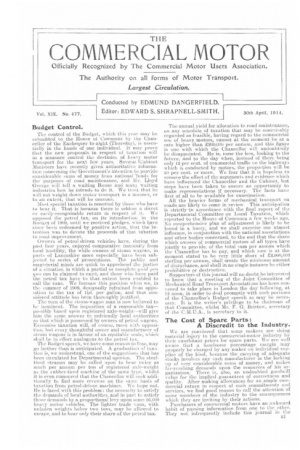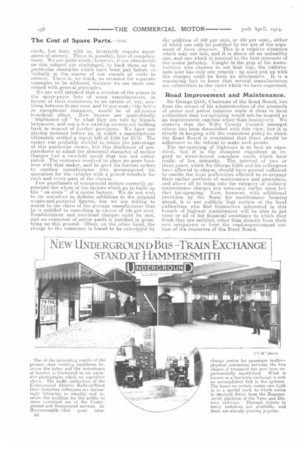Budget Control.
Page 1

Page 2

If you've noticed an error in this article please click here to report it so we can fix it.
The control of the Budget, whieh this year may be submitted to the House ot Commons by the Chancellor of the Exchequer to-night (Thursday), is essentially in the hands of one individual. It may prove that the new proposals in respect of taxation will in a measure control the destinies of heavy. motor transport for the next few years. Several vCabinet Ministers have recently given autuoritative information concerning the'Government's intention to provide considerable sums of money from national 'funds for the purposes of road maintenance, and Mr. Lloyd George will tell a waiting House and man waiting industries how he intends to do it. We trust that he will not weight down motor transport in a manner, or to an extent, that will be onerous-.
Most special taxation is resented by those who have to bear it, That is because there is seldom a direct or ea,sily-reeognizable return in respect of it. We opposed the petrol tax, on its introduction in the :Budget of 1909, until we received pledges. IvIlich have since been redeemed by positive action, that the intention was to devote the proceeds of that talation to road improvement.
Owners of petrol-driven vehicles have, during the past four year's, enjoyed comparative immunity from local hostility, the while owners of steam wagons, in parts of Lancashire, more especially, have been subjected to series of prosecutions. The public and magisterial minds are quick to apprehend the justice of a situation in which a partial or complete (plid pro quo can be claimed to exist, and those who have paid the petrol tax have to that extent been enabled to call the tune. We foresaw this position when we, in the summer of 1909, designedly refrained from opposition to the tax of lid, per gallon, and that considered attitude has been thoroughly justified. The turn of the steam-wagon man is now believed to be imminent. The imposition of a reasonable tax— possibly based upon registered axle-weight---will give him the same answer to unfriendly local authorities as that which is possessed by owners of petrol wagons. Excessive taxation will, of course, meet with opposition, but eveiy thoughtful owner and mai-mini-:tures of steam wagons is in favour of an equitable scale., which shall be in effect analogous to the petrol lax. The Budget speech, we have some reason to fear, may go farther than is anticipated. A graduation of taxation is, we understand, one of the suggestions that has been circulated for Departmental opinion. The steeltired steamer may be called upon to bear twice as much per annum per ton of registered axle-weight as he rubber-tired machine of the same type, whilst it is even rumoured that the Chancellor will seek addition.ally to find more revenue on the same basis of taxation from petrol-driven machines. We hope not. He is faced with this problem: -the necessity to satisfy the demands of local authorities, and in part to satisfy those demands by a proportional levy upon some 16,000 heavy motor vehicles. The lighter trade vans, with unladen weights below two tons, may be allowed to escape, and to bear only their share of the petrol tax. The annual yield for allocation to road maintenance, on any scheduie of taxation that may be conceivably regarded as feasible, having regard to the commercial use of heavy motors, cannot at the moment be at a rate higher than 2200,000 per annum, and this; figure is one with which the Chancellor will undoubtedly be disappointed. He is, none the less, looking to the future, and to the day when, instead of there being only 12 per cent, of commercial traffic on the highways which is conducted by motors, the proportion will be 50 per cent. or more. We fear that it is hopeless to remove the effect of the arguments and evidence which have influencedthe Chancellor and the Cabinet, but steps have been taken to ensure an opportunity to make representations if necessary. The facts have first of all to be available for examination.
All the heavier forms of mechanical transport on roads are likely to come in review. This antieipation is strictly in accordance with the final report of rho Departmental Committee on Local Taxation, which reported to the HOUS3 of Commons a, kw weeks ago. No comprehensive plan of adjustment is likely to be found in a hurry, and we shall exercise our utmost influence, in conjunction with the national associations and other bodies concerned, to the end that the share which owners of commercial motors of all types have jointly to provide, of the total sum per annum which the Chancellor has to pay, and which sum is at the moment stated to be very little short of 22,000,000 sterling per annum, shall create the minimum amount of disturbance, and shall in no single instanee be either prohibitive or destructive.
Supporters of this journal will no doubt be interested to know that a meeting of the Joint Committee of Mechanical Road Transport Associations has been convened to take place in London the day following, at 12 noon, in order to deal promptly with such portions of the Chancellor's Budget speech as may be necessary. It is the writer's privilege to he chairman of that Committee, whilst Mr. F. G. Bristow, secretary of the C.M.U.A., is secretary to it-.
The Cost of Spare Parts : A Discredit to the Industry.
Wo are convinced that some makers. a-re doing material injury to the commercial-motor inchistry by their exorbitant prices for spare. parts. We are well aware that a handsome percentage margin may properly be charged by any maker -on individual supplies of the kind, because the causing of adequate stocks involves any such manufacturer in the locking Hp of very considerable sums of money, and makes far-reaching demands upon the resources of his organization. There is, also, an undoubted goodwill value for the implied guarantees of correctness and quality. After making allowances for an ample commercial return in respect of such commitments and services, we find good reason to call the attention of some members of the industry to the consequences which they are inviting by their actions. Purchasers of commercial motors have an a wkward habit of passing information from one to the .other. They not infrequently include this journal m the n1
circle, but they, with us, invariably require assurances of secrecy. _There is, possibly, fear of complie.ations. We are quite ready, however, if our statements on this subject are challenged, to back them up by particular examples which have been put before us verbally in the course of our rounds of visits to owners. There is, we think, no occasion for separate examples to be adduced, because we are more concerned with general principles.
We are well satisfied that a revision of the prices in the spare-parts lists of some manufacturers, in favour of their cestomers, to an extent of, say, anything between 30 per cent. and e0 per cent—the latter in exceptional instances, would be of eV-roiled beneficial. effect. New buyers are undoubtedly "frightened off" by what they are told by friends bereaeent, and not a few existing owners are holding back in respect of further purchases. We have one glaring instance before us, in which a manufacturer ultimately settled a repair bill of £400 for £175. The nicker was probably wishful to retain the patronage of this particular owner, but this disclosure of preparedness to admit the abnormal character of earlier charges had a two-fold result that was not anticipated. The customer resolved to place no more business with that maker, and he gave his further orders to another manufacturer who accornpa.med his quotation for the vehicles with a priced schedule for each and every part of the chassis.
Few purchasers of commercial motors correctly ern premate the whole of the factors which go to build up the " on costs" of a motor factory. We do not wish to tie ourselves to definite additions to the original wages-andenaterial figures, but we are willing to assent to the claim of the average manufacturer that he is entitled to something in excess of 100 per cent. Establishment and overhead charges must be met, and no consumer of motor parts is justified in grumbling on this ground. Often, on the other hand, the charge to the consumer is found to be calculated by
the addition of 300 per cent. or 400 per cent., either of which can only be justified by the use of the argument of force majeure. This is a relative situation which may not last, and it is above all an unhealthy one, and one which is inimical to the best intereste of the motor industry. Caught in the grip of the manufacturer who chooses to act that way, the unfortunate user has only one remedy : he must put up with the charges until he finds an alternative, it is a reassuring fact to know that several manufacturers are subscribers to the views which we have expressed.
Road Improvement and Maintenance.
Sir George Gibb, Chairman of the Road Board, has from the outset of his administration of the proceeds of motor and petrol taxation made it clear to local authorities that tar-spraying would not.be treated as an improvement expense other than tentatively. We observe that the Wilts County Council amongst others has been dissatisfied with this view, but it is clearly in keeping with the consistent policy to which the Road Board is committed that there should be adherence to the refusal to make such grants.
The tar-spraying of highways is at best an expe dient, but it is the Che i apest expedient n regard to water-bound macadam roads which bear traffic of low intensity. The interval of two or three years, which Sir George Gibb and his colleagues have allowed to elapse, should have proved sufficient to enable the local authorities affected to re-arrange their earlier methods of maintenance and procedure, and above all to bring into the category of ordinary maintenance charges any neceeeary outlay upon further tar-Spraying. Now, however, with additional provision by the State for maintenance looming ahead, it is not unlikely that certain of the local authorities who find themselves interested in this branch of highway maintenance will be able to get some or all of the financial assistance to which they think they are entitled, other than directly from their own ratepayers or from the road-improvement section of the resources of the Road Board.
























